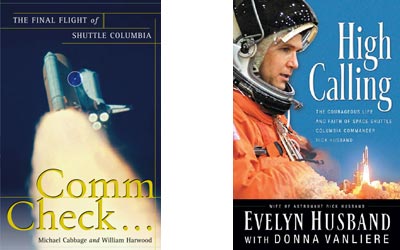Reviews: Columbia plus one yearby Jeff Foust
|
| One would think that the story behind the loss of Columbia has already been told in countless articles published in the last year, but Cabbage and Harwood do an excellent job putting all the details together in a coherent, even riveting narrative. |
Anyone who followed the news regarding the investigation of the Columbia accident doubtless saw the bylines of Michael Cabbage and William Harwood at one point or another in the last year. Cabbage is the space editor of the Orlando Sentinel, while Harwood is the space consultant for CBS News who was written for outlets as diverse as the Washington Post and Spaceflight Now. Both highly-regarded journalists, they covered the investigation in detail for their respective publications, and joined forces to write Comm Check…, providing a detailed history of Columbia’s final mission.
One would think that the story behind the loss of Columbia has already been told in countless articles published in the last year, including many by Cabbage and Harwood themselves. However, the two do an excellent job putting all the details together in a coherent, even riveting narrative. After an initial chapter recounting the accident itself, the first half of the book goes into the events leading up to the accident, including the debate regarding the severity of the foam impact on the orbiter during launch. This debate, revealed through documents, email messages, and interviews with many of the key participants, proves damning: it shows how even very smart people can delude themselves that nothing is wrong when in fact there is a serious problem.
The second half of Comm Check… takes the reader through the accident and inquiry by the independent Columbia Accident Investigation Board (CAIB). While the first half largely included details that became known through the investigation, the second half offers relatively fresh insights into the investigation itself. The book describes how the members of the CAIB bonded with—and sometimes argued with—one another. It also discusses the tension between the board and NASA that grew as the investigation wore on, through interesting tidbits and vignettes of the investigation. Combined, the two halves of the book provide the reader with a detailed yet concise (just over 300 pages) history of the accident from before the launch through the reaction to the CAIB’s final report.
Comm Check… does provide some background on the STS-107 crew but, given the length of the book and the focus on the accident and investigation, this background is fairly limited: a page or two for each member of the seven-person crew. In High Calling, Evelyn Husband writes the biography of her late husband, mission commander Rick Husband. Born and raised in Amarillo, Texas, Husband decided at the age of four that he wanted to be an astronaut: not an uncommon career choice for a boy of that age, particularly given the excitement around that time of the first manned spaceflights. Unlike most others who dreamed of becoming astronauts at that age, though, Husband had the talent and determination to turn that dream into reality.
| Husband decided at the age of four that he wanted to be an astronaut, but unlike most others who dreamed of becoming astronauts at that age, he had the talent and determination to turn that dream into reality. |
When Evelyn Husband meets her future husband while students at Texas Tech, he tells her that he has mapped out his career on a path to enable him to become an astronaut: be a military test pilot, gain thousands of hours of flight time, earn an advanced degree. Much of the book recounts how he followed that path with considerable success, yet still had to apply to NASA four times before he was finally accepted to the astronaut corps. Guiding him throughout this journey are his deeply-held religious beliefs, discussed in detail in the book (Thomas Nelson is a Christian book publisher, and the book is categorized as both inspirational as well as a biography.) Only about the last third of High Calling is devoted to the aftermath of the accident, as Evelyn deals with the loss of her husband and her children cope with the loss of their father.
Certainly the final chapter of the saga of the Columbia accident has yet to be written. It is months—possibly a year or more—before the shuttle returns to flight. Moreover, the accident helped instigate a broad review, by both the Bush Administration and the public at large, at the role NASA should play in the future, one that is still playing out just weeks since the unveiling of a new space policy. For a study of the accident and investigation itself, though, it will be hard to outdo the account provided in Comm Check…, while it’s unlikely a more detailed biography of Husband will be written than High Calling. Last spring may have been too soon to start reading books about the accident, but that’s not the case now.
